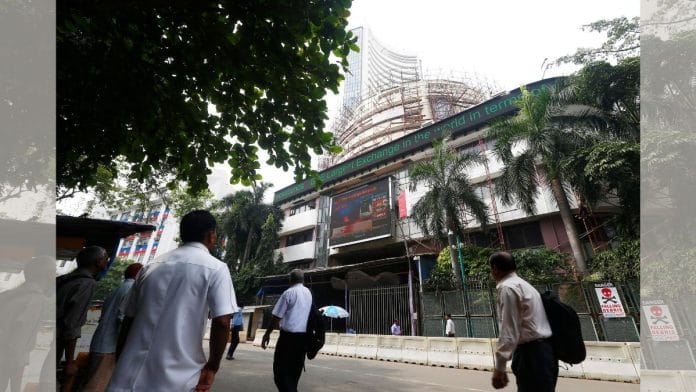New Delhi: Despite Indian stock markets recovering from the sharp fall 4 June when the poll results came out, investors are now likely to alter their strategy and rely on underlying company fundamentals to make investments without being swayed by “narratives”, according to analysts.
The basic argument is there’s been a sustained period of “politics drives economics”, which pushed up the value of particular stocks. This has especially been the case for stocks of public sector companies and infrastructure firms, in keeping with the narrative of broad infrastructure creation by the Modi government. One brokerage has even dubbed these ‘Modi stocks’.
ThePrint previously reported how several public sector enterprises saw their stock prices rise by as much as 300-400 percent in just one year and that this was led by the public sector infrastructure companies.
Similarly, the private sector infra companies too have seen their stock prices rise significantly. The BSE India Infrastructure Index, an aggregate of the large listed infrastructure companies, remained largely flat from 2014-2020 but has risen more than 250 percent since then.
This trend shows up in cases of individual stocks, as well. UltraTech Cements, for example, saw its stock price grow roughly 97 percent from 2014 to 2020 and then 111 percent since then. L&T’s stock price increased just 26 percent between 2014 and 2021 and has surged more than 150 percent since then.
In May 2024, brokerage firm CLSA India released a report listing 54 ‘Modi stocks’ linked to capital expenditure, public sector companies, or corporate houses.
“We… separate out the stocks which are perceived to be the most direct beneficiaries from popularly expected policy measures if we see a third term for the PM Modi-led ruling party with a strong electoral majority,” the report had said. “As these stocks and sectors are rallying more on perceptions — for easy recall we call them ‘Modi stocks’.”
Some moderation is expected now in this trend of buoyancy in capex-linked stocks, with stocks in the fast-moving consumer goods (FMCG) segment likely to see strong growth since the expectation is that the new government will take steps to increase people’s purchasing power.
“We expect a reset in the market’s hitherto cavalier investment stance toward ‘narrative’ stocks,” Kotak Institutional Equities said in a note. “We have struggled with the implied growth and profitability assumptions embedded in the market capitalisation of several ‘narrative’ stocks (capital goods, electric utilities and PSUs).”
Wodehouse Capital has discussed a situation underway where “politics drive economics versus the other way around”. “In response to this uncertain environment, we prefer defensive sectors like FMCG, utility, IT and healthcare, which offer stability,” it added.
The agency said its recommendation is stock picking, which refers to investing in any stock only if its underlying fundamentals are strong, and investing in dividend-yielding stocks.
This shift to stock picking is something other agencies predict as well, with Motilal Oswal saying in a note that sectors like industrials, railways, defence, and PSUs could see a moderation in valuations.
“After the initial disappointment and anxiety around government formation, we expect the focus to revert to fundamental bottom-up stock picking,” it said. “That said, sectors with over-heated valuations and recent sharp outperformance viz. industrials, railways, defence, and PSUs may see more moderation in valuations before they become attractive again from the risk-reward perspective.”
One of the key sectors expected to grow and see an increase in stock prices is the FMCG sector.
“In the near term, defensives (FMCG, IT and healthcare) will outperform capex-oriented sectors,” Rupen Rajguru, head of Equity Investments and Strategy at Julius Baer India, said. These stocks are referred to as ‘defensives’ because they remain largely stable, so investing in them can be a defensive action during volatility in the overall market.
“Additionally, some sectors with strong narratives — PSUs, defence, railways will take a breather and can potentially see some de-rating from the current near all-time high valuations.”
According to Vincent K.A., research analyst at Geojit Financial Services, the FMCG sector has underperformed in the stock market over the past year because of weak rural demand, adverse weather conditions, lower growth in agriculture production, high inflation, and increased local competition.
However, he said things are now changing, partly due to actions taken by companies but also because of the prospect of a normal monsoon and an expectation that the new government might shift its policies towards the social sector.
“The sector is now showing signs of a gradual recovery in rural demand, driven by a reduction in inflation and strategic measures by companies to boost volumes,” he said.
“Additionally, the prospects of a better monsoon and potential policy shifts towards social economics could further enhance rural demand. Consequently, we have a strong positive outlook on the sector,” he added.
Moksha M. Munoth & Aahaana Singh are interns with ThePrint.






